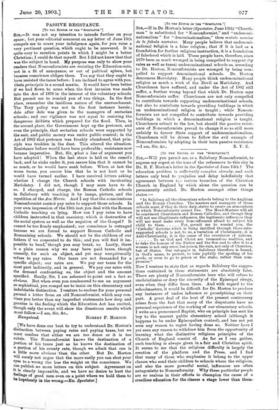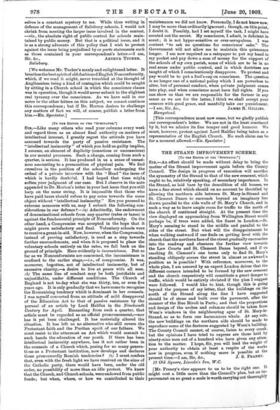I-TO THE EDITOR OP THU 'SPECTATOR:']
SIR,—Will you permit me, as a Salisbury Nonconformist, to
express my regret at the tone of the references to this city in Dr. R. F. Horton's letter in the Spectator of June 13th ? The education problem is sufficiently complex already, and such letters only tend to prejudice and delay indefinitely that agreement between ti.o various branches of the Christian
Church in England by which alone the question can be permanently settled. Dr. Horton amongst other things states :—
"In Salisbury all the elementary schools belong to the Anglican and the Roman Churches. The masters and managers of these schools must, if they do their duty, strive to create an atmosphere in which Nonconformity cannot live. The Head-Masters will all be convinced Churchmen and Roman Catholics, and though they will not use illegitimate influences, the legitimate influences they will use must make every Nonconformist afraid to subject his
child to them For, permit me to remind you, the ' Catholic ' doctrine which is being instilled through these rate- supported schools is not, to us, a variation of Christianity, it is Anti-Christianity, it is the cause of the overthrow of nations. To us God and Christ are tremendous realities, and to take the honour of the Father and the Son and to offer it to a woman is not only error, but poison, the ruin, not only of Churches, but of States. Our ratepayer in Salisbury therefore is bound, in God's name, to protest, to take joyfully the spoiling of his goods, or even to go to prison or the stake, rather than com- promise."
Now I venture to state that as regards Salisbury the sugges- tions contained in these statements are absolutely false. There are plenty of Nonconformists here who will refuse to
unchristianise or deny the sincerity of the Episcopal clergy, even when they differ from them. And with regard to the schoolmasters, it would be difficult for Dr. Horton to- produce any instances of undue influence or proselytising on their
part. A great deal of the heat of the present controversy arises from the fact that many of the disputants have no personal experience of the working of our elementary schools. I write as a pronounced Baptist, who on principle has sent his
boy to the nearest public elementary school (although it happens to be under Episcopalian control), and has not yet
seen any reason to regret having done so. Neither have I yet seen any reason to withdraw him from the opportunity of learning what the distinctive religious principles of the Church of England consist of. As far as I can gather, such teaching is always given in a fair and Christian spirit. It seems to me that the religious difficulty is largely the
creation of the platform and the Press, and I find that many of those who emphasise it belong to the upper classes who send their children to schools where the religious, and also the more powerful social, influences are often
antagonistic to Nonconformity. Why these particular people are so zealous in their efforts to champion the cause of a creedless education for the classes a stage lower than them-
selves is a constant mystery to me. While thus writing in defence of the management of Salisbury schools, I would not shrink from meeting the larger issue involved in the contest, —viz., the absolute right of public control for schools main- tained by public money. But that is a political issue, and it is as a strong advocate of this policy that I wish to protest against the issue being prejudiced by ex parts statements such as those contained in your correspondent's letter.—I am, [We welcome Mr. Tucker's manly and enlightened letter. It breathes the best spirit of old-fashioned English Nonconformity, which, if we read it aright, never trembled at the thought of Anglicanism being a kind of contagion which could be caught by sitting in a Church school in which the conscience clause was in operation, though it would never submit to the slightest real tyranny over the conscience. As we have said in our notes to the other letters on this subject, we cannot continue this correspondence ; but if Dr. Horton desires to challenge any matters of fact we will, of course, publish a letter from him.—En. Spectator.]











































 Previous page
Previous page